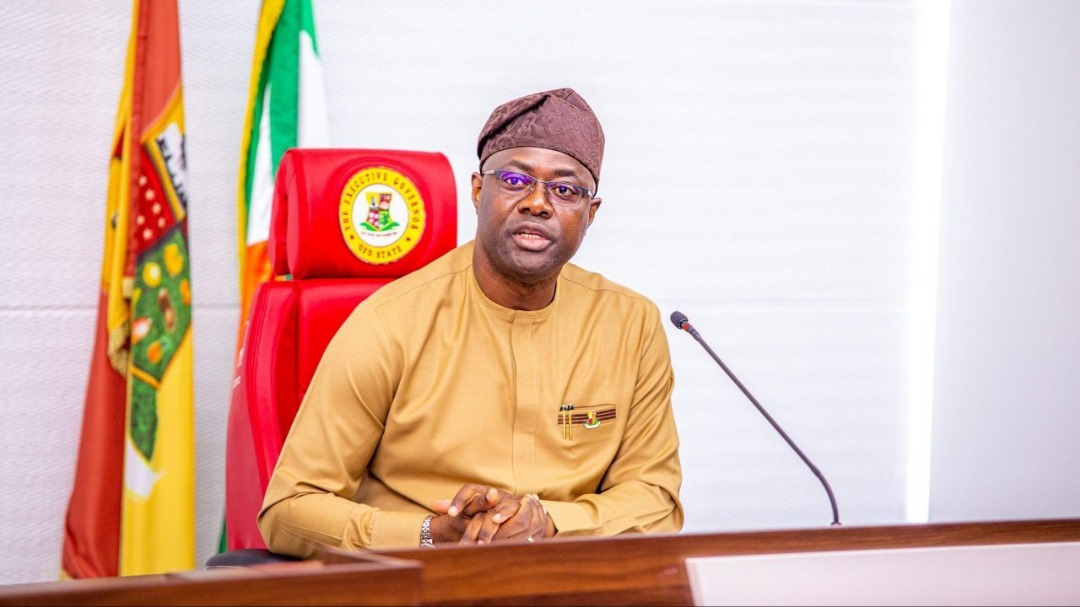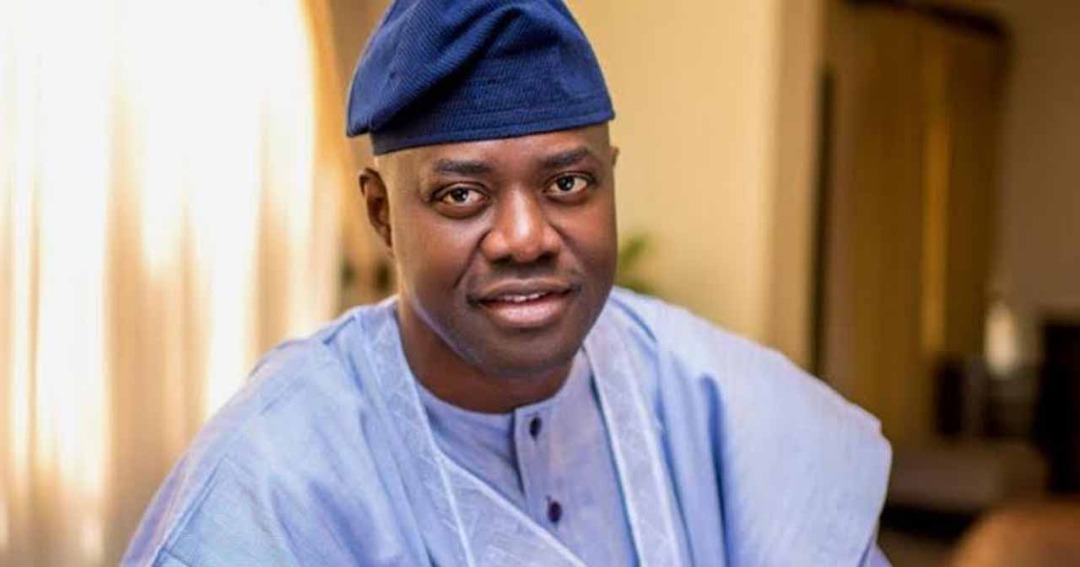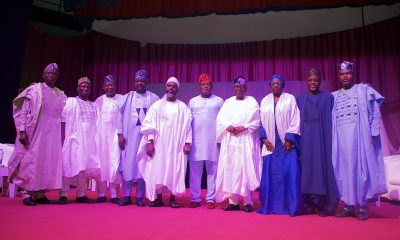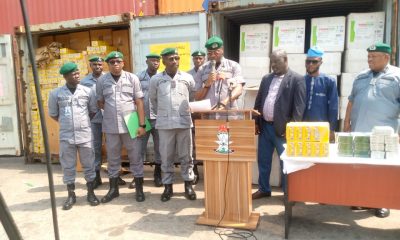society
‘WE ARE COMMITED TO PROTECTING YOU,’ AMOTEKUN REASSURES OYO CITIZENS

‘WE ARE COMMITED TO PROTECTING YOU,’ AMOTEKUN REASSURES OYO CITIZENS
Sahara Weekly Reports That The Commandant, Amotekun Corps, Oyo State, Col Olayinka Olayanju (retd), has reassured citizens of Oyo State that the corps is committed to protecting them at all cost. The Commandant gave the assurance following reports that bandits who were being dislodged from Zamfara State by the ongoing military onslaught are heading southwards. He said the outfit’s well trained personnel were patrolling boundaries of the state aggressively to prevent bandits and criminals in whatever hues from relocating to the state.
While commending the Executive Governor of Oyo State, Governor Seyi Makinde for providing the necessary material and moral support to the corps that has set it on a firm pedestal; the Commandant said, “We got intelligence reports that bandits and hoodlums maybe heading southward as a result of military activities in Zamfara State. I want to reassure Oyo citizens that we are aware and our men are already on the lookout for the bandits, other criminals and strange faces, especially at our boundaries.
“We are at alert and our men are carrying out operations regarding this at Irepo, which is the boundary with Ogun and Kwara states and the Republic of Benin, to make sure that the bandits do not relocate to our state. They will be stopped. Our men will pick them up. We won’t allow criminals to relocate here. We are carrying out confidence building patrols at Irepo, Olorunsogo, Oorelope, Iwajowa, Ibarapa Central and North LGAs” He stated.
Col. Olayanju also pointed out that the corps is working in tandem with agencies within the state and South-west Amotekun commanders to ensure peace and stability so that citizens can go about their lawful duties. He said since its establishment last year, Amotekun has brought relative peace and stability to the state compared to the same period the previous year. “There has been a considerable difference with where we are now and where we were two years ago. Through our security strategies, we have been able to bring to the barest minimum incidences of suspected herdsmen attack in Oyo State. I want to commend the people of Oyo State for standing firmly behind Amotekun and giving us their unalloyed support. Without their support we wouldn’t have gone this far,” the Commandant noted.
Beyond the external threats coming through the border from other states, the commandant stressed that Amotekun has also been contending with local threats from criminals and cultists and overwhelming them. He stated that they receive complaints daily from citizens and they act promptly and effectively. He noted the case of one informant of Isale-Oyo in Oyo town who passed information to the corps about a group of hoodlums terrorising the neighbourhood. “Our men acted on the intelligence received and we were able to apprehend some of the criminals and in the process recovered two guns from them. Such information has been helpful to us toward containing criminal and deviant behavious.”
Furthermore, two serial Church burglars; Oma James, Male, 41, and Agbada Orin, 45, were arrested in Ilora community Afijio Local Government during one of their operations. The duo have been breaking into churches and stealing electrical equipment and selling them. Luck ran out for them in one of their operations on the 17th June when the Amotekun Corps in Afijio Local Government arrested the suspects and recovered all the stolen equipment. The suspects were handed over to the Police for prosecution.
On the fight against cultism, the commandant said the corps has made inroad in this regard. “Beyond banditry and armed herdsmen, we are also checkmating cultists. We recently apprehended some Eye Confraternity members who were attacking the house of one Alhaji Owolowo. They were caught in the act by the Atiba Amotekun Corps with the support of the Oyo East, Oyo West Amotekun Corps and members of Atiba Police unit. Twelve (12) men – Oniwinde Kunle, Peter Gbolahan, Femi Oyewole, Olayemi Quadri, Folaranmi Tunde, Owodunni Bolaji, Toyib Bello, Isiaka Samad, David Boluwatife, Ayinde Bamigbose, Joshua Olamide, Adedeji Abdullahi – were arrested. Two of them who sustained injuries were treated at a hospital in the locality. Two locally made pistols, one live cartridge, an empty shell and three axes were recovered from them. They have been transferred to the Atiba police station. The suspects are presently in the Abolongo Prisons, Oyo.”
Meanwhile, residents in the state have commended Amotekun for the strides it has made in just one year. They charged the corps not to rest on its oars while charging politicians not to play politics with security issues because it is a collective responsibility that requires the support of all.
The idea of a collaborative security outfit among the six states in the South-West (Lagos, Oyo, Ogun, Ondo, Osun and Ekiti) came out of the summit held in Ibadan on 25th June 2019, following a spate of kidnappings, banditry and armed robbery in the region. The insecurity put considerable pressure on the South-West governors at a time many farmers were being forced to abandon their only means of livelihood and villagers were deserting their homes due to incessant attacks. Held under the auspices of the Development Agenda for Western Nigeria (DAWN) Commission, the Director General, Mr. Seye Oyeleye, had assured before the meeting that the outcome would provide concrete ideas on how to secure the region. That idea birthed the Amotekun Corps.
news
Journalists for Good Governance Shines Searchlight on Local Government Administration

Journalists for Good Governance Shines Searchlight on Local Government Administration
…Calls for Accountability in Nigeria’s Grassroots Governance
LAGOS, Nigeria — A civil society coalition known as Journalists for Good Governance(JGG) has intensified public debate on transparency and accountability within Nigeria’s local government system, urging media professionals, civil society actors, and citizens to hold grassroots leaders accountable.
Speaking an event in Lagos recently, the acting chairman of the society, Comrade Bunmi Obarotimi said that despite reforms such as the Supreme Court’s 2024 ruling granting financial autonomy to all 774 Local Government Areas (LGAs), systemic challenges continues to hinder effective service delivery and responsible stewardship of public funds.
“Local governments are the closest tier of government to the people — yet too often they remain the least transparent. Without civic oversight and vibrant media, promises of autonomy ring hollow.” the acting chairman said.
The Journalist for Good Governance emphasised crucial roles that journalists can play in uncovering discrepancies in council spending, flagging poor service delivery, and educating citizens on their rights. Their call comes amid wider efforts by media and civic organisations to bridge accountability gaps. The civil society initiatives had previously launched monitoring campaigns to track local government expenditures and have been quietly advocating for transparency in how public money is deployed.
The leaders of the Journalists for Good Governance (JGG) highlighted the importance of physical assessment and citizens engagement on projects to boost people’s confidence, urging local councils to adopt open data platforms and proactive information dissemination in compliance with the Freedom of Information Act. Experts say the majority of LGAs currently lack operational websites or digital portals, further limiting public scrutiny.
The Journalists for Good Governance initiative aligns with sustained advocacy by civil society groups and governance experts calling for a collective approach to strengthening democratic accountability, and has decided to engage in critical and holistic assessments of how Local Governments is being run and the impact and quality of projects they embark-on and to address deficits in transparency and public trust.
Meanwhile, some state governments have signalled support for improved community engagement. In Lagos State, authorities reiterated a commitment to enhancing community media platforms as vehicles for civic participation and accountability at the grassroots level.
The renewed spotlight on local government administration has reignited public debate over fiscal responsibility and priorities. Controversies such as the widely criticised Adamawa council chairmen’s wives trip to Istanbul — which drew public outrage for perceived misuse of public funds — underscore why watchdog groups say stronger oversight mechanisms are urgently needed at the grassroots.
Citizens and activists have welcomed the journalists’ initiative, calling for sustained media engagement that goes beyond headlines to influence policy and accountability reform.
The civic rights advocates note that real change will require robust legal frameworks, a free press, and empowered communities equipped to demand transparency at every level of governance.
As Journalists for Good Governance mobilises its members, the coming months are likely to see heightened media attention on grassroots administration — from council budgets and service delivery to the enforcement of public information laws and digital transparency initiatives.
society
Good Politics Or Just Power? Two Years After The Elections

Good Politics Or Just Power? Two Years After The Elections
Two years after the last general election, Nigerians are justified in asking a direct question: is our democracy stronger today than it was then? Democracy is not measured by how many offices a party controls or how loudly politicians speak. It is measured by integrity, accountability, and the lived experience of the people. Good Politics demands more than victory at the polls; it demands moral leadership and visible progress in the lives of citizens.
The debate over amendments to the Electoral Act should have provided an opportunity to deepen transparency and strengthen public confidence. Instead, hesitation to fully embrace reforms that safeguard credible vote transmission and accountability has fueled doubt. In a nation where electoral credibility remains fragile, any reluctance to reinforce safeguards sends the wrong signal. Good Politics stands firmly for processes that are open, fair, and beyond suspicion.
The party in power commands significant authority across the federation. With control of the presidency, many state governments, a strong presence in the National Assembly, and influence at local levels, there should be no anxiety about reforms that ensure free and fair elections. Confidence in leadership is demonstrated not by dominance, but by a willingness to subject power to scrutiny. Politics rooted in the omoluabi ethos embraces fairness, transparency, and responsibility, even when inconvenient.
This is the standard long associated with Awolowo, whose politics emphasized discipline, social welfare, education, and institutional strength. His vision was not merely about holding office, but about transforming society through principled governance. Good Politics follows that tradition. It rejects manipulation, arrogance, and the concentration of power without accountability. It insists that authority must serve the people, not itself.
Beyond electoral reforms, democracy must deliver tangible relief. Across the country, households struggle with rising prices and shrinking purchasing power. Small businesses are burdened by escalating costs. Young people search for opportunities that remain scarce. When economic hardship deepens, democracy feels abstract. Good Politics recognizes that political legitimacy is reinforced when citizens can see and feel the benefits of governance.
The concentration of power within a single political structure should translate into coordinated reform and measurable development. When it does not, questions naturally arise. Democracy weakens when dominance replaces performance. It weakens when loyalty to party eclipses loyalty to principle. The omoluabi tradition teaches that character defines leadership. Without character, authority becomes hollow.
A healthy democracy requires credible elections and compassionate governance. It requires leaders who understand that politics is a moral enterprise. Two years into this administration, many Nigerians remain uncertain about the direction of both our democratic processes and their daily welfare. If democracy is to endure, it must reflect Good Politics: fairness in competition, integrity in conduct, and compassion in governance. Anything less falls short of the standard that our history and our values demand.
news
GEN CHRISTOPHER GWABIN MUSA SUPPORT INITIATIVE COMMENDS STATE-FEDERAL COLLABORATION IN ZAMFARA

GEN CHRISTOPHER GWABIN MUSA SUPPORT INITIATIVE COMMENDS STATE-FEDERAL COLLABORATION IN ZAMFARA
The Gen Christopher Gwabin Musa Support Initiative (GCGMSI) has commended the Zamfara State Government for its decisive contribution to security operations through the donation of newly acquired armoured personnel carriers (APCs), surveillance drones, and other critical operational equipment to troops and security agencies in the state.
This commendation was contained in a statement signed by the Convener of the GCGMSI, Ibrahim Dahiru Danfulani, Sadaukin Garkuwan Keffi/Betara Biu, and made available to the press.
The equipment was formally commissioned on Wednesday, February 18, by the Grand Patron of the GCGMSI and Minister of Defence, General Christopher Gwabin Musa, OFR (rtd.), in a ceremony at the Government House, Gusau. The event was attended by senior military officers, heads of security agencies, and top officials of the Zamfara State Government.
The GCGMSI, in its statement, hailed the donation as a “transformative and timely intervention” that aligns perfectly with its core objective of advocating for and supporting tangible measures that enhance the operational capacity and welfare of Nigeria’s security forces. The Initiative praised Governor Dauda Lawal’s administration for moving beyond rhetoric to actionable, material support, describing the move as a “blueprint for state-level collaboration in national security.”
“The provision of these assets by the Zamfara State Government is a testament to visionary leadership and a profound commitment to the peace and stability of its people,” the GCGMSI statement read. “It represents the exact kind of synergistic partnership between state and federal authorities that the GCGMSI champions. This initiative will significantly close operational gaps, boost the confidence of our gallant troops, and send a strong message to criminal elements.”
Speaking at the commissioning, General Musa emphasized that sustained collaboration is indispensable in confronting the nation’s evolving security challenges. He specifically commended Governor Lawal for his proactive support.
“Governor Dauda Lawal has demonstrated exemplary leadership and an unwavering dedication to the security of Zamfara State,” the Defence Minister stated. “The provision of these armoured vehicles, surveillance drones, and other operational equipment will undoubtedly boost the morale and operational effectiveness of our troops and other security agencies on the ground. This is a commendable effort that should be emulated by others.”
The newly commissioned assets, which include multiple APCs and advanced surveillance drones, are expected to dramatically enhance the mobility, protection, intelligence-gathering, and rapid response capabilities of security forces, particularly in the state’s remote and difficult terrains where anti-banditry operations are ongoing.
In his remarks, Governor Lawal reiterated his administration’s steadfast commitment to being a reliable partner in the security architecture. He urged security agencies to deploy the new resources responsibly and effectively to safeguard lives and property.
The Federal Government, through the Ministry of Defence, reaffirmed its commitment to continuing and deepening such partnerships with state governments across the nation to strengthen coordination and resource allocation in the collective fight against insecurity.
The GCGMSI concluded its statement by urging other state governments to take a cue from Zamfara’s “bold and pragmatic” approach, affirming that such concrete support is vital for achieving lasting peace and security across Nigeria.
-

 celebrity radar - gossips6 months ago
celebrity radar - gossips6 months agoWhy Babangida’s Hilltop Home Became Nigeria’s Political “Mecca”
-

 society6 months ago
society6 months agoPower is a Loan, Not a Possession: The Sacred Duty of Planting People
-

 society5 months ago
society5 months agoReligion: Africa’s Oldest Weapon of Enslavement and the Forgotten Truth
-

 news6 months ago
news6 months agoTHE APPOINTMENT OF WASIU AYINDE BY THE FEDERAL GOVERNMENT AS AN AMBASSADOR SOUNDS EMBARRASSING









